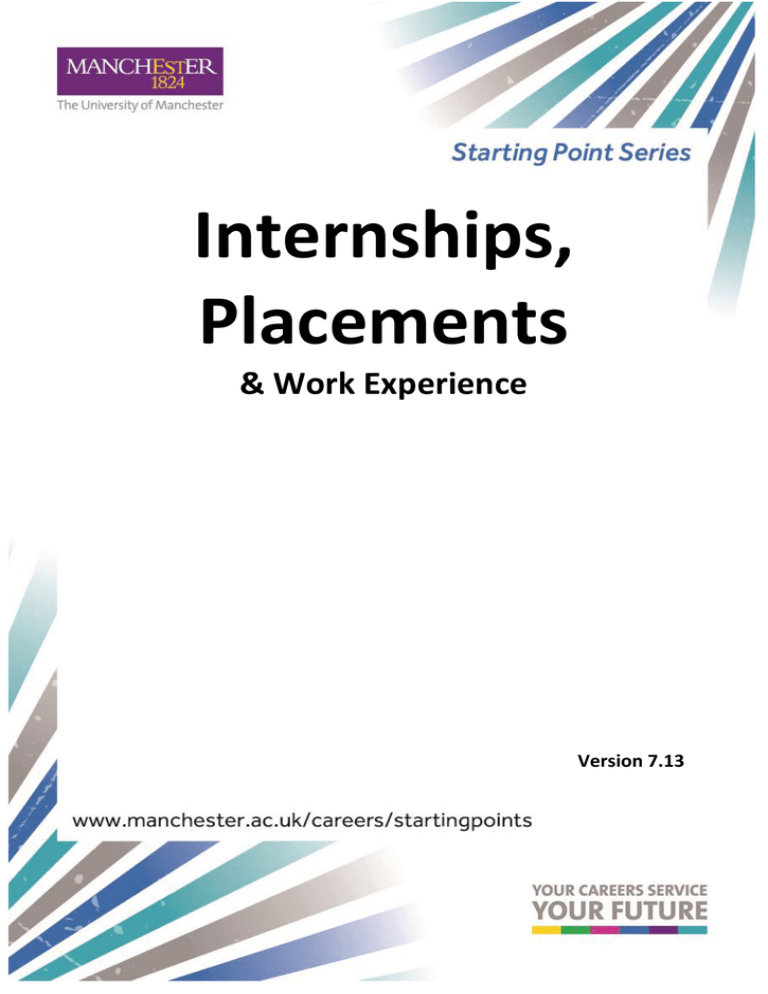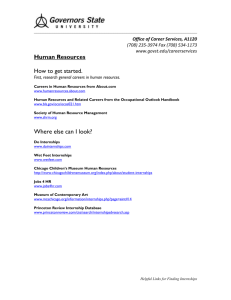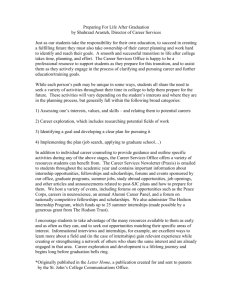Industrial placements and internships are valuable ways to gain
advertisement

Internships, Placements & Work Experience Version 7.13 Internships, placements and work experience are valuable ways to gain the skills employers want. This publication will help you research the opportunities available. The Careers Service does not arrange internships, placements or work experience but we can show you where to find vacancies and offer advice and guidance with your application and interview. What are internships, placements and work experience? Internships and placements are short periods of professional experience. During an internship or placement, you will be doing similar work to a normal employee of the organisation. They give you a taste of what graduate work is like and can help you make industry contacts. Many employers use internships and placements as a fast track onto their graduate programmes. Perform well, and you might be offered a full-time job. Sometimes employers use different names for their placement and internship schemes. Law firms describe their summer opportunities as Vacation Schemes where another company might call it an internship. Some organisations call their 12 month opportunities internships, which can be confusing. But they all provide professional experience, whatever they are called. Work experience is a more general term for any kind of experience you gain. This could be ‘Work shadowing’ for a day A few days/weeks working with a business to get hands on experience Part-time work Volunteering for a charity/not-for-profit organisation A course related project working with a company Why are they important? A good degree is important to employers but organisations also want graduates to demonstrate that they have undertaken some work experience. Internships, placements and other forms of work experience give you an insight into the working environment and help you develop skills that you can use within your degree studies and once you graduate. If you want to break into a particular career, relevant work experience can give you a competitive edge. Some careers such as teaching, journalism and the environment require you to have gained work experience to prove your skills and commitment. A successful internship or placement can sometimes lead to a graduate job with the same organisation, as many organisations use them as a way of ‘talent spotting’ for their graduate roles. 1 Internships/Placements Career insight Possible job offer or sponsorship Possibly paid Casual summer work Transferrable skills, e.g Team working, problem solving Paid work - reduce student debts General benefits Enhance your CV Stand out from the competition! Contacts and networks Develop skills employers look for... ‘Work experience’ Career insight A way in to competitive sectors Flexible length/timescale Generally unpaid Summer/Vacation Internships Summer and vacation internships provide a brief exposure to what it’s like working for an organization, and are a great way to get relevant experience of a particular occupation or industry. Summer internships are typically 8-10 weeks, though some can be as short as 4 weeks, and during this time you will work as a regular employee of that company, taking on work tasks and responsibilities as part of a team. Graduate employers value internship experience highly, and it can be a key way for you to stand out from other applicants. Many employers use internships as a fast track onto their graduate programmes. Perform well, and you might be offered a full-time job. Getting relevant experience is important for many industry sectors, so take the opportunity to apply for summer or vacation internships if you can. Some organisations also offer short internships over Easter or Christmas vacations. Internships are typically paid at a similar rate to industrial placements, but pro-rata to reflect the shorter length of time. Industrial Placements Some degree courses offer the chance to spend 9-12 months in industry between your pre-final and final years. These provide an opportunity to gain experience and put your academic skills into practice. If you are registered on a “With Industrial Experience” degree programme then an industrial placement is compulsory and you must find a placement then obtain approval from your School before you accept it. The career benefits of a placement are huge, so don’t worry too much about losing contact with your friends during your year out, or your degree being a year longer. You will be more employable after a placement and may even receive a graduate job offer, so think about the long term. Most industrial placements are paid and tend to be aimed at engineering, management, IT and science students. Students on placement usually pay only part of the standard university fees while on placement, but you will earn a respectable salary, typically £13,000 - £14,000 or higher in multinational companies. If your degree does not include a formal industrial placement, you may still ask to undertake one. You need permission from the University to do this, so discuss it with someone in your School before taking any action. International students must also seek advice from the International Advice Team as taking a year out without still being registered on your degree programme will affect your visa status. Casual summer work Casual summer work can be a valuable addition to your CV and a good way to earn money, even if it isn't related to your ideal career. Employers like to see evidence of working in teams, using your communication skills, problem solving, and other transferrable skills, and casual summer jobs are a popular way to develop these. Casual summer jobs could be in tourism, childrens’ summer camps, assisting at conferences or festivals, or fruit picking. You can often find these opportunities abroad, which can help you to develop your foreign language skills. Salaries vary a great deal and may include benefits like accommodation and meals instead of a full salary. Placements and internships abroad Whether your course includes a formal year abroad placement or you are considering a shorter period of work experience in another country, working abroad can develop your language skills and understanding of other cultures. Some organisations advertise directly with the Careers Service, and there are a large number of websites and organisations that can help you find work experience abroad. Unlike in the UK, placement and internship students are not necessarily paid a salary, so you need to evaluate the benefits of the experience and think carefully about how you can support yourself. You should also be aware that there is no regulation of international work experience opportunities and some companies charge high fees to help you arrange your visa, find opportunities and plan your experience. Ensure you shop around, Google the organisation and ask lots of questions before committing yourself. Try to find independent reviews by people that have used the organisation before. If you are undertaking a placement in another EU country as part of your course, which is 3-12 months, you may qualify for a maintenance grant through the Erasmus Work programme. Work shadowing Work shadowing is an informal type of work experience where you observe someone in their role to understand how they do their job. This is usually a short term activity – a few days at most – aimed at providing an insight rather than hands on experience. This can be useful experience to gain in careers where few formal internships exist, or where the role is not one an intern or placement student can do with their level of experience, e.g. solicitor. Work shadowing is rarely advertised and you will need to make speculative approaches to an individual or organisation to request this. See our advice on ‘finding hidden opportunities’ later in this guide, and our ‘Getting Connected’ Starting Point Sheet, which you can also download at: www.manchester.ac.uk/careers/students/findingwork/networking Other types of work experience The following are also good ways to gain work experience: Part-time work A great source of work experience, it can help you build transferrable skills like team work and problem solving, but also relevant experience for some occupations like IT, translation or marketing. See our guide for more information: ‘Part-time jobs – Finding and Applying’. Volunteering for a charity/not-for-profit Another useful source of transferrable skills, as well as helping a good cause. Some volunteer roles can provide valuable career related skills, for example: event management; administration, marketing, or retail experience. Some occupations require applicants to have undertaken considerable voluntary work, e.g. teaching, social work, working with people with disabilities. Finding placements, internships and work experience Treat your search for a placement or internship the same way you would approach getting a graduate job. For many organisations, internships and placements are the first stage in their graduate recruitment process. There can be a lot of competition for internships with big companies and in most cases the selection process is similar to graduate jobs. Maximise your chance of being offered an interview by getting advice on your application at the Careers Service. If your degree includes a compulsory placement, your department should have a placement tutor who may be able to help you to identify organisations to apply to. If you need to arrange your own work experience then you should research the organisations that you want to apply to. Do they advertise vacancies or will you have to apply speculatively? Where are they advertised? The work experience section of our site has links to many placement, internships and work experience jobsites www.manchester.ac.uk/careers/workexperience CareersLink has the latest vacancies both in the UK and internationally www.manchester.ac.uk/careers/students/careerslink International internships, placements and casual summer jobs can also be found via the Careers Service website, with information about Erasmus Work grants at: www.careers.manchester.ac.uk/students/findingwork/workexperience/ internationalworkexperience/ Vacancies and news are posted on our Summer Internships and Work Experience Facebook group and Twitter. You can also join a Facebook group for your School to receive updates. Find these at: http://www.careers.manchester.ac.uk/students/services/interactive/ Graduate employer directories published by Prospects and Rate My Placement provide details for many large organisations. Often they have internships and placements as well as graduate vacancies. These are free from the Careers Resource Centre. Some sectors like engineering, finance and law have their own directories that are available for reference in the Careers Resource Centre. Exhibitors at our Autumn Fairs advertise internships and placements as well as graduate jobs www.manchester.ac.uk/careers/events o The Science, Engineering and Technology Fair o The Finance, Business and Management Fair o The Law Fair Some sectors/occupations may have specific sources of jobs such as websites, professional bodies or you may need to do more proactive job-hunting. See our sector pages for more information: www.manchester.ac.uk/careers/students/options/sectors Volunteering opportunities from hundreds of charities and not-for-profit organisations are advertised in CareersLink. Access these and more information about volunteering at: www.manchester.ac.uk/volunteers www.manchester.ac.uk/careers/students/careerslink When should I do an internship, placement or work experience? Many internship and placement opportunities are aimed at pre-final year students, and are not open to first years, finalists or graduates. However, it’s never too early to undertake work experience, as the earlier you start the more employable you will be by the time you graduate. The routes to getting experience can depend on your year of study, so see our guide below for details. Some forms of work experience you can undertake during any year of study, for example casual summer work or short work experience of a few days or weeks. Work experience for first year students Internships at some organisations may be open to first year students, so it’s always worth checking, if in doubt. Check their recruitment website, speak to them if you can, either at a fair/presentation/open day or via their recruitment hotline if they have one. If this doesn’t result in any opportunities, there are other options open to you as a first year student. 1. Apply to internships and schemes specifically for first years Some companies offer these, often calling them a 'spring internship' or 'insight day'. These are often the larger companies so if you are interested in management, finance, banking, law or IT careers these are worth a look. Be aware that closing dates are typically in the autumn, so apply early. Find a handy list of schemes at: www.manchester.ac.uk/careers/students/findingwork/workexperience/firstyears 2. Apply to small to medium size companies Rather than using internships as a part of their graduate recruitment programme, smaller businesses usually have a more immediate need for your help in their business. You might be the only intern there, helping them with a new website, social media strategy or completing a project they just don't have time to deliver. This means that having the right skills and attitude is more important than what year of study you are in. Smaller companies usually advertise between January and summer, and you can find their vacancies in CareersLink. www.careers.manchester.ac.uk/careerslink 3. Look for sponsorships, sponsorships or bursary programmes A small number of companies offer scholarships, sponsorships or bursaries to students that are interested in a career with them. Whilst you have to commit to working for that organisation after graduation, these provide you with extra cash and a guaranteed work placement each summer (possibly an industrial placement too if it's an option on your degree). The best way to stay informed about these opportunities is to google ‘undergraduate sponsorships’ or ‘undergraduate bursaries’, and follow us on Facebook, both via your School group and the Internships and Work Experience group www.manchester.ac.uk/careers/students/services/interactive/facebook 4. Look for work shadowing or a few days/weeks of experience Some employers may consider an informal approach for a short period of work experience. These opportunities are rarely advertised, so you will need to be proactive in finding these ‘hidden’ opportunities. See our Work Shadowing advice above, and advice on ‘finding hidden opportunities’ later in this guide on how to do this. 5. Take a casual summer job A great way to build your transferrable skills, so if you can't find anything career related, don't be afraid to do something else that can earn you money and put skills on your CV. www.manchester.ac.uk/careers/students/findingwork/workexperience/vacationwork 6. Find other ways to get experience and skills Part-time work can sometimes be career related, and even where it isn’t, it’s great for showing skills and evidence of working in teams. For some careers (e.g. teaching, social work), volunteering experience is valuable, or even essential. Even if it's not essential for your career plans, it's great developing your skills and shows your commitment to supporting a good cause, so it's well worth doing. Active involvement in student societies is also a great way to take responsibilities (e.g. treasurer, social secretary, president) and develop your skills. www.manchester.ac.uk/careers/students/findingwork/parttimejobs www.manchester.ac.uk/careers/students/employable/volunteering http://manchesterstudentsunion.com Work experience for final year students Many student internships and placements will not be open to you at this point as you are no longer a pre-final year, however you can apply for other opportunities, including direct entry to graduate programmes. 1. Look for work shadowing or a few days/weeks of experience Some employers may consider an informal approach for a short period of work experience. These opportunities are rarely advertised, so you will need to be proactive in finding these ‘hidden’ opportunities, so see our advice later in this guide on how to do this. 2. Apply for a graduate internship Graduate internships are aimed at those about to finish their programme, and are usually 412 months long. You can find details of a range of graduate internships schemes, including our Manchester Graduate Internship Programme, at: www.manchester.ac.uk/careers/mgip www.manchester.ac.uk/careers/students/findingwork/findingworkaftergraduation/ findinggraduateinternships 3. Going on to a full time Masters degree? Apply for a summer internship Some employers will allow you to do a summer internship after your undergraduate degree, if you are going straight on to a short taught Master’s degree. This is because it will be only 1 year until you graduate and could join their graduate programme. The same would not apply if you were planning to do a PhD. 4. In addition, find other ways to get experience and skills during your final year As for first year students, taking a part-time job, volunteering or getting actively involved in a student society are great ways to get experience and build your skills. http://www.manchester.ac.uk/careers/students/findingwork/parttimejobs http://www.manchester.ac.uk/careers/students/employable/volunteering http://manchesterstudentsunion.com Work experience for postgraduates Because of the demands of your programme, you may not have the same opportunity to undertake a full time work experience opportunity like an internships or placement, unless it is part of your course. So bear in mind the same advice as that for final year students, above, for opportunities which can be fitted around the demands of your programme. When should I apply for internships, placements & work experience? Many organisations advertise opportunities months in advance of the start date. Most large or multinational organisations start advertising in October or sometimes earlier for positions starting the following summer, so the earlier you start looking the best chance you have of securing what you want. Positions are often filled before the official closing date, so apply as soon as you can! Many big companies advertise between September and December. Local or smaller companies may also have positions available over the summer and these tend to be advertised after Christmas. Casual summer jobs are also advertised later in the academic year, often between January and April. Keep looking; companies contact us all year round with opportunities Finding hidden opportunities Not all employers offering placements, internships and work experience widely advertise their opportunities. They may have relationships with specific universities, or have only one or two opportunities and receive enough speculative applications that they don’t need to advertise. Work shadowing and very short work experience opportunities are not usually advertised and a more proactive approach is required to find these. You can start by researching the sector/location you are interested in and trying to identify other companies. Use company directories like www.yell.co.uk and www.applegate.co.uk, then check their websites for vacancies or send a tailored speculative application outlining what you are looking for, and what you can offer. Read news articles for that sector and let friends, family and contacts know you are looking for advice and work experience for that area so they can help you. They may have a chance conversation with an engineer, buying manager or IT professional in a company you are interested in. Use social media sites like LinkedIn and Twitter to help you make contacts. There may be Manchester alumni you could approach (there are several Manchester alumni groups on LinkedIn) and LinkedIn groups you can join to find out more about the sector you are interested in. You can find more advice on finding hidden opportunities, making new contacts and using social media on our website and in our ‘Getting Connected’ Starting Point Sheet, which are available at: www.manchester.ac.uk/careers/students/findingwork/networking Proactive job hunting Company X Company Y Company directories e.g. yell.co.uk Contacts Company Z Who are their competitors? News/Articles Career fairs/events Jobs in newspapers Jobsites Careers Service & Vacancy adverts Your School Speculative applications If you can’t find an advertised opportunity, you could write speculatively to an organisation to ask about work experience with them. Target your CV and cover letter to the organisation and position you are applying for and ensure you highlight why you are interested in their organisation, and what you can offer them: your key strengths, skills, suitability and enthusiasm. If they can’t provide a placement or internship you could try to negotiate a few days’ work or some work-shadowing, all of which can help your CV. Unpaid experience – issues to consider In this tough economic climate, finding paid work experience opportunities can be challenging. In some sectors, even during boom times it was difficult to find paid experience, and unpaid work experience or internships were considered the 'norm'. Your Careers Service does not endorse working unpaid as despite the great number of unpaid internships out there, many are in fact illegal and should be paid. We include some suggestions on our website so that you can consider some of the issues, understand your rights better, and know where to draw the line if you do decide to take any unpaid experience: www.manchester.ac.uk/careers/students/findingwork/employmentrights/unpaid Applying for placements, internships and work experience Employers will expect a professional CV with covering letter, or application form, and many large organisations require online applications. Some may also use psychometric tests as part of the selection process. See our other Career Essentials guides for advice on the application process, and our website at: www.manchester.ac.uk/careers/students/applicationsinterviews International student issues for placements and internships Non-EEA students with a Work Restriction Stamp in their passport do not need to obtain permission before working while they are registered as a student at a UK institution. This includes summer placements, internships and 9-12 months industrial placements (as long as they are accredited and a compulsory part of the degree) Students must not have a prohibition stamp in their passport. Students should not work more than 20 hours per week during term-time (except where the placement is a necessary part of your studies). Students should not engage in: o Business services; o Self-employment; o Professional sportsman / entertainer services. The International Advice Team provides support to all international students studying at The University of Manchester. Advice and information are offered in a variety of areas including immigration issues and work permits. Appointments with a member of the International Advice Team are available Monday to Friday, you can make an appointment by telephoning 0161 275 5000 or going to the Student Services Centre. You can find out more information on work permits and your right to work in the UK during your studies on our website: www.manchester.ac.uk/careers/students/international/empduringstudy National Insurance and Income Tax Everybody who works in the UK has to pay National Insurance and give their employer a National Insurance (NI) number. UK nationals obtain a NI number automatically when they are 16 years old. If you get a job in the UK, you will need to get a NI number too. To get your NI number, you need to ring the National Insurance Number Allocation Service on 0845 6000 643. They will give you information on what you need to do next (this may involve making an appointment at your local Jobcentre Plus or filling in an application) but you should clarify the process with them. The nearest Jobcentre Plus for most students is in Rusholme. Rusholme Jobcentre Plus 96 Wilmslow Road Rusholme, Manchester M14 5BJ Telephone: 0161 912 8300 Due to the volume of applicants, it can take time to receive a NI number. If this is the case, your employer should be able to create a temporary number for you. You must, however, remember to give them your proper number when you receive it. If you continue to use a temporary number, you will pay more tax than you should. For further information on National Insurance, go to www.careers.manchester.ac.uk/students/findingwork/employmentrights/tax Careers Service Resources The Careers Service website Advice on finding and managing your placement, links to many placement, internship and part-time work websites (both UK and internationally), and opportunities for first year students. www.manchester.ac.uk/careers/workexperience CareersLink – The Careers Service vacancy system Internships, placements, vacation jobs, part time jobs and graduate internships. www.manchester.ac.uk/careers/vacancies Careers Service website – Finding Graduate Internships section Advice on finding internships after you have graduated. www.manchester.ac.uk/careers/students/findingwork/findingworkaftergraduation/findinggraduatei nternships Manchester Graduate Internship Programme 4-12 month internships for graduates. www.manchester.ac.uk/careers/mgip Social Media – Summer Internships and Work Experience Facebook, your School Facebook and Work Experience Twitter Work experience, internships and relevant subject specific information wwwmanchester.ac.uk/careers/students/services/interactive Publications CV guide Cover Letter guide Preparing for Interviews Assessment Centres and Psychometric Testing Presentation Skills Getting Connected In Tray Exercise The following publications, produced by Careers Service staff, cover a wide selection of topics and sectors, including how to find work experience in that sector. Titles specifically on work experience are: Part-time jobs Getting Work Experience in Earth & Environmental Sciences Work Experience in Life Sciences Work Experience in Chemistry, Physics or Material science Making the most of your work experience These publications are available in the Careers Resource Centre or can be downloaded at: www.manchester.ac.uk/careers/startingpoints Speak to a Career Consultant If you are a current University of Manchester student, you can book an appointment with a Career Consultant who will help you with your search for a placement or internship. They can advise on where to find vacancies, how to target your application and offer help with interview technique. Find out how to book an appointment at: www.manchester.ac.uk/careers/guidance or telephone 0161 275 2829. Websites for placement, internship and work experience vacancies Prospects and Target Jobs websites These sites list many internship and placement providers with articles giving tips and advice. www.prospects.ac.uk/work_experience.htm http://targetjobs.co.uk/work-experience Rate My Placement Internship and placement opportunities with a range of employer, including student reviews www.ratemyplacement.co.uk STEP Offers a range of placements for students in their second or penultimate year. Projects typically take place over eight weeks in the summer, but are also available as a 12 month sandwich year or graduate internship. www.step.org.uk Grad Cracker Internships and placements with science, engineering and technology employers www.gradcracker.com Enternships Internships for students with an entrepreneurial flair, working for exciting small and start up businesses. Mostly paid. www.enternships.com NASES Vacation Link Service provided by the National Association of Student Employment Services. Provides details of university jobshops across the UK, many of which can help you find vacation work outside Manchester during the summer. www.nases.org.uk/vacationlink BUNAC Work abroad programme. www.bunac.org/uk Camp America Summer camp work in the USA. www.campamerica.co.uk IST Plus Work abroad organisation www.istplus.com British Council Language Assistants Teaching opportunities abroad. www.britishcouncil.org/languageassistants Resort Jobs Paid jobs in summer and ski resorts across the world. www.resortjobs.co.uk Additional websites are listed in the work experience section of our site at: www.manchester.ac.uk/careers/workexperience A range of books on gap year and vacation opportunities can be found in the Careers Resource Centre – check the library catalogue www.manchester.ac.uk/careers/library



